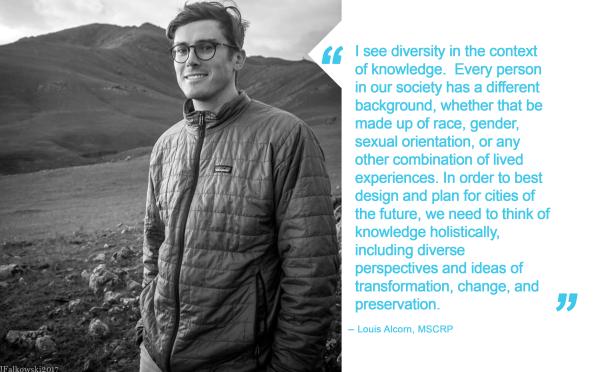Louis Alcorn, Student

Louis received his undergraduate degree is in Urban Studies and GIS and before coming back to graduate school worked as a transit planner. His focus at UT has been in sustainable and equitable transportation, which involves both quantitative data analysis from the engineering side as well as qualitative and theoretical measures to ground results in reality through the process of collaborative community planning.
In the School, what degree are you seeking? What year are you in?
I am in my second year of obtaining two masters degrees: MS Community & Regional Planning and MS Transportation Engineering. No officially recognized program between the two schools exists, but based on ideas and support from my wife (a dual degree masters student in MBA/MPA) and a little bit of forward planning, I’m on track to graduate in three years with both degrees.
In what ways have you incorporated diversity and equity issues as part of your educational experience?
In my research with Dr. Alex Karner, I’ve had the opportunity to work on numerous projects examining transportation equity. These include co-authoring a paper evaluating participatory budgeting processes in Fresno, California and contributing to a Federal Transit Administration (FTA) white paper documenting an improved practical range of options that transit agencies can use to measure equity impacts in the service planning process.
With respect to diversity, my thesis research examines the integration and relationships between informal and formal transit services in Lagos, Nigeria. This project, for which I spent a month in Africa collecting primary source materials and conducting interviews, examines the implications of the proposed Bus Reform Project, which is slated to eliminate informal transit services (called ‘danfos’) through the incremental implementation of formal bus routes across the megacity. There is no doubt that a myriad of problems exist with the current system, which basically amounts to mafia-organized chaos. However, the top-down, calculated, modernist ideals promoted by the government organizations, largely drawn from the Global North, ignore the situated knowledges and qualitative importance embedded within the existing informal transit system.
What does diversity mean to you?
I see diversity in the context of knowledge. The answer to complicated planning issues cannot be found in a textbook written by a consortium of white males or even from the all-to-often hailed works of Jane Jacobs. These examples are simply perspectives. Every person in our society has a different background, whether that be made up of race, gender, sexual orientation, or any other combination of lived experiences. In order to best design and plan for cities of the future, we need to think of knowledge holistically, including diverse perspectives and ideas of transformation, change, and preservation.
Can you describe the sense of community at the School?
There is a strong sense of community within the planning program – the program is small and everyone knows everyone else. There are numerous opportunities to embark on international trips with faculty and other students to learn about planning phenomena abroad. What I wish there was more of is more opportunities for cross-disciplinary studies with other departments within our school (e.g. Architecture, Landscape Architecture, etc.) and other and other colleges entirely. I’ve prioritized learning diverse epistemologies in my studies (e.g. geography, policy, engineering, information/data), but this has neither been encouraged or simple for other students. I think that this is a pivotal part of being a good planner.
What are your aspirations –big or small– for the future?
I have big aspirations to some day work as an international planning consultant to help deliver sustainable and resilient transportation infrastructure to the rapidly expanding megacities of the Global South through a combination of contextual participatory planning, creative financing mechanisms, and novel technologies.
